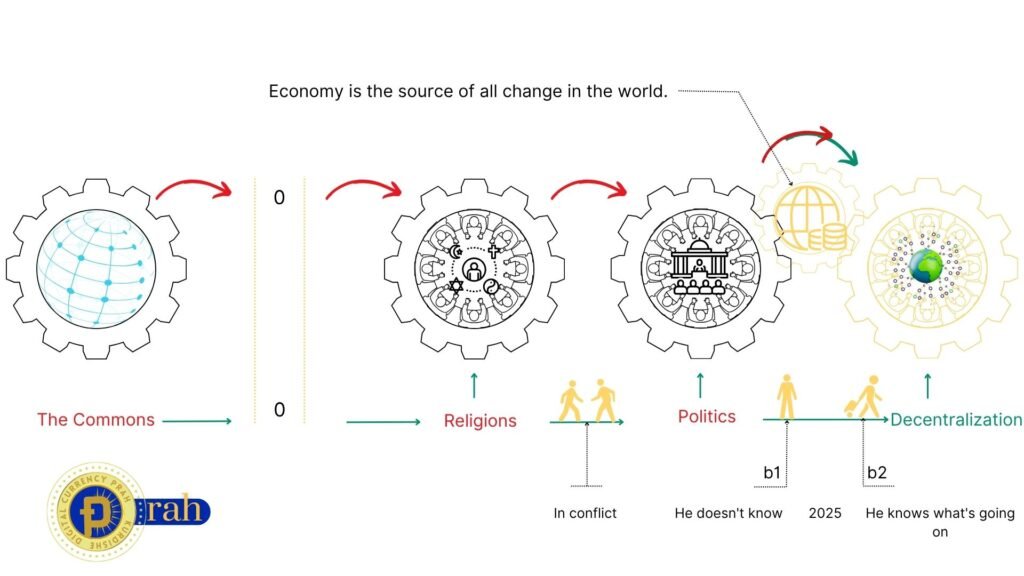
0000
The smooth transition for humans from the completion of a theory to the beginning of a new hypothesis
Smart Contracts and Artificial Intelligence: The Shift of Authority from Traditional Institutions to the Digital World
While most contemporary political and legal debates revolve around constitutional reform, expanding state powers, or rebuilding trust in institutions, a different, more profound and silent transformation is underway. This transformation is not being managed from traditional decision-making rooms, but rather from keyboards and digital networks. New tools such as smart contracts and artificial intelligence are reshaping the relationship between the individual and the system, and redrawing the true map of power, trust, and ownership.
Today, we are not simply discussing a technological update, but rather witnessing a radical shift of popular authority from traditional structures to decentralized digital platforms. This is often happening without sufficient awareness on the part of the relevant elites, and without legislative or institutional readiness to accommodate this change.
First: Smart Contracts — From Paper to Code
A smart contract is a digital program running on a blockchain network that automatically executes the terms of an agreement between parties. What once required legal mediation, signatures, and sometimes years of litigation is now executed in seconds, without a lawyer or a judge.
These contracts have become automated execution tools to which the trusts of the next generation are transferred: from digital assets (NFTs) to decentralized finance (DeFi), and even commercial and real estate contracts.
By 2024, more than 14 million smart contracts had been launched on blockchains such as Ethereum and BNB Chain, and had been modified, adopted, or deleted within the context of financial and social transactions exceeding hundreds of billions of dollars.
These contracts are no longer just code; they represent documents of intent, contracts of responsibility, and new pathways of authority—shifting from individual hands to decentralized structures, in a gradual displacement of the role of traditional institutions.
Second: Artificial Intelligence—The Fruit of the Smart Contract and the Digital System. Artificial intelligence, and especially its generative models, did not emerge in a vacuum. It was born in an environment prepared for it by blockchain, smart contracts, and the vast amount of data flowing from the digital economy. It is no exaggeration to say that:
Generative AI (such as GPT and Cloud) has become part of “automated delegation,” where individuals choose to step outside traditional decision-making frameworks and interact with tools that have learned from their data, finances, and behavior.
Remarkable developments:
The generative AI market surpassed $45 billion in 2024, with compound annual growth rates exceeding 35%.
Today, AI tools are used to create contracts, evaluate markets, make investment decisions, and even manage teams digitally.
They are trained daily on millions of data points generated by smart contracts, making them more closely aligned with the real-world legal and financial landscape than many traditional institutions.
Third: The Digital Delegation Generation — From “Citizen” to “Active User”
This generation no longer waits for a political representative to speak on their behalf or a judge to resolve their disputes. Instead, they design their own systems, activate them using tokens and cryptocurrencies, and participate in their management through decentralized voting.
Key figures:
More than 500 million cryptocurrency users by 2024.
More than 100 million people interact daily with smart contract, DeFi, and NFT-based applications.
The new digital generation is estimated at 1.8 billion young people aged 15 to 34.
Thousands of digital communities have emerged on platforms like Discord, Telegram, and Reddit, governed by DAO contracts and operating without a state.
These individuals are not only demanding change, but are also taking shortcuts and creating a parallel world.
Fourth: Lack of legal and political awareness—a looming danger.
Ironically, most current legal discussions remain trapped in 20th-century concepts. We talk about citizenship, representation, and guarantees, while the new generation is effectively transferring its ownership, perceptions, and decisions to decentralized code.
There are currently no clear legal frameworks to address whether a smart contract is legally binding, or how to handle damages resulting from code execution or bugs.
The most alarming aspect is that many institutions, including global banks and major investment funds, have begun adopting these tools and shifting their focus to them, at a time when legislation is still unable to even clearly define them.
Fifth: Recommendations — Addressing the Issues
Recognizing smart contracts within legal frameworks as entities subject to regulation, auditing, and accountability.
Developing legal and hybrid frameworks that combine legal codes and jurisprudence to ensure flexibility and fairness.
Integrating artificial intelligence tools into judicial and arbitration institutions, provided that strict ethical guidelines are in place.
Establishing specialized legal units within the country to engage with digital communities and their platforms.
Launching awareness and training programs for judges and legislators on blockchain, artificial intelligence, smart contracts, and cryptocurrencies.
Sixth: Reference Tables — To Understand the New Reality
Clause
Traditional Contract
Smart Contract
Mediator
Lawyer/Judge
Program Code
Execution
Manual and Appealable
Automatic and Irrevocable
Geography
Within State Boundaries
Global, Decentralized
Integrability
Weak
High with Artificial Intelligence
Costs
High (Lawyers, Time)
Relatively Low
Transparency
Limited
Complete (Open Blockchain)
Censorship
State
Digital Community or the Code Itself
Conclusion:
What is happening today is not just a “tech wave,” but a change in the nature of authority, legitimacy, and trust. If legal institutions and elites do not adapt to this transformation, they will find themselves irrelevant.
The current generation is not presenting itself as a rebel, but as the architect of a new system that transcends the boundaries of the state and the law, redefining ownership, obligation, and the future.